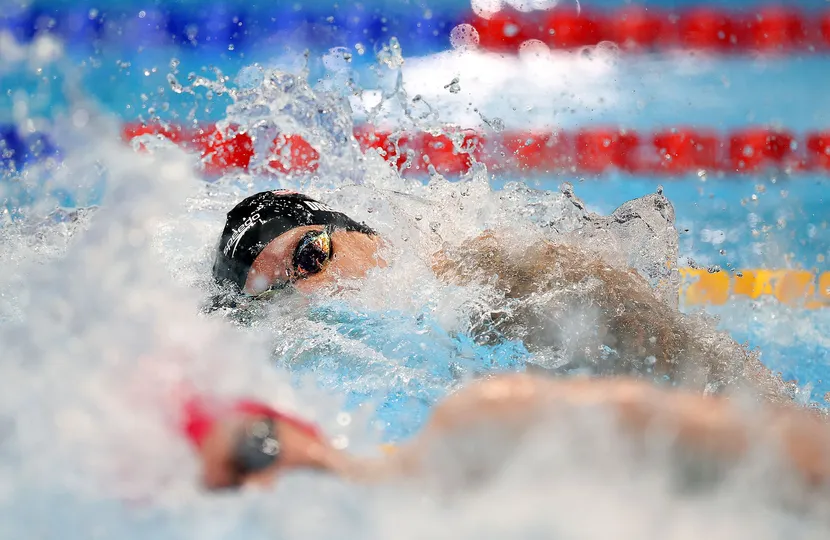Since the Duna Arena opened its doors in the Hungarian capital in early 2017, Budapest has quickly become one of the top global destinations for fast swimming, and it started with its inaugural international event in the 2017 World Championships. The global showcase of the world’s top aquatic talent will return to the Duna Arena in June 2022.
Men’s 100 Freestyle
A myriad of major swimming events have been held in the facility over the last five years, from World Championships, World Cups, and Junior World Championships, making the Duna Arena a reliable facility for fast and exciting swimming. As the countdown to this summer’s World Championships marches on, we look back at some of the most memorable races from the maiden voyage of the now-famous Duna Arena, continuing with the men’s 100 freestyle final from 2017. The men’s 100 freestyle has long been known as the “blue ribbon event” in swimming. It’s one of the few events to have taken place at every single Olympics beginning in 1896. For a long time it was the test to prove the fastest man in the world, and due to its longevity the winner of the event has taken on a level of stardom in the sport similar to the 100m dash in track and field.
The Favorites
Heading into the 2017 Worlds, the race looked to be up in the air, with many considering Australia’s Cameron McEvoy to be the gold medal favorite. A year prior in 2016, McEvoy took the world by storm with a 47.04 in April at the Australian Trials, and had a lot of hype around him to win the gold medal in Rio later that summer. The gold medal went to an Australian, but not the one people expected, with 18-year-old Kyle Chalmers winning the gold with a 47.58, and McEvoy finishing seventh. McEvoy ended up getting the upper-hand over Chalmers in April 2017 at the World Trials with a 47.91 to Chalmers’ 48.20 as they looked to be a solid 1-2 force moving ahead to Budapest. But Chalmers had scratched from the championships to focus on his health, clearing the way for 18-year-old Jack Cartwright to get the second spot after a 48.43 in April. The Americans were led by 28-year-old Nathan Adrian and 20-year-old Caeleb Dressel, who both raced in Rio, with Adrian claiming bronze and Dressel finishing sixth in his international senior debut. Adrian had been around the block for a while, winning gold in London in 2012, while Dressel had been a rising star, winning the world junior gold in 2013. Both of them were under 48 seconds at the U.S. Trials with Adrian just out-touching Dressel 47.96 to 47.97. The fastest time in the world though belonged to another rising star in the sport, 19-year-old Duncan Scott of Great Britain, who raced to a 47.90 at the British Trials in April, and was also 0.01 faster than Dressel in the Rio final to finish fifth.

In Budapest
Dressel however became the talk of the town in Budapest when he led off the USA 4×100 free relay on night one with a 47.26, a full second faster than every other lead-off leg in the field, and 0.64 faster than Scott’s world leading time from April. The semi finals were led by France’s Mehdy Metella (47.65), who at age 24 was having one of the best meets of his career, followed by Dressel (47.66), Adrian (47.85), McEvoy (47.95), Cartwright (47.97), and Scott (48.10). Realistically, the race looked to be between Metella and Dressel, but there were enough challengers in a race that had little room for error that it could have been any of the top six. Adrian had been a clutch performer in the last few years, and McEvoy had a best time faster than anybody in the field, while Scott and Cartwright were looking to get on their first international podiums individually in their young careers. Add in Brazil’s Marcelo Chierighini, who split 46.85 on Brazil’s relay, and this race was one of the must-see of the entire meet. Dressel was still a few weeks shy of his 21st birthday, but the American team felt they had a star in the making based off of what Dressel had been swimming in short course yards in the preceding months. And this 100 free final felt like it would be his coming out party that he was indeed the real deal moving forward.

The Race
Dressel blitzed the first 15 meters of the race, gaining a half body length lead on the rest of the field that he held through the turn, flipping at 22.31 ahead of McEvoy (22.56) and Metella (22.58). The question was whether Dressel would be able to hang on against guys like McEvoy and Scott, who was fourth at the turn, or Adrian, who was fifth, as they all had strong second 50’s, something Dressel hadn’t quite perfected – yet. At the 75, McEvoy was inching up closer, and Metella wasn’t far behind either. It looked as if the American was starting to tighten up, and perhaps McEvoy would be able to redeem himself after a disappointing finish at the Olympics. Adrian was also charging against Metella. As they hit 15 meters to go, Dressel hit another gear, not taking a single breath the last 15 meters of the race, something that his teammate Adrian had done for so many years prior. And he extended his lead at the finish, touching in 47.17 to win his first individual gold medal at the senior level. Adrian, using a similar tactic to Dressel to also not take a breath the last 15, had out-touched Metella to win the silver medal at 47.87 to Metella’s 47.89.

McEvoy had finished just off the podium with a 47.92, with Scott tying for fifth with Brazil’s Marcelo Chierighini at 48.11. Dressel’s second 50 was 24.86, faster than that of Adrian (24.90), Scott (25.22), Metella (25.31) and McEvoy (25.36), with only Jack Cartwright being faster (24.85) as he finished seventh at 48.24. Dressel erupted in celebration, sitting on the lane line and slapping the water in excitement with Adrian coming over to high five him and raising his fist in the air in appreciation. It seemed like a passing of the torch moment for Adrian, to give the new star Dressel his time in the spotlight as he crossed a new level to stardom – world champion in the 100 freestyle. Dressel went on to win both the 50 free and 100 fly later in the championships and also won three gold medals in relays – both mixed relays plus the men’s medley and became an instant star in the sport. Flash forward to 2022, Dressel is the reigning Olympic champion in the 100 freestyle while he was face new challengers in Budapest this time around with Olympic finalists Alessandro Miressi of Italy, Maxime Grousset of France, Hwang Sunwoo of South Korea, and David Popovici of Romania.
Source: FINA

